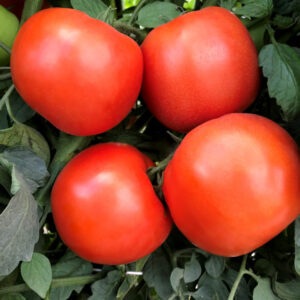
Rambler Photo© Sakata Seeds
By CMG Adrienne
The 2024 Rodeo Tomato is “Rambler,” a new hybrid variety bred for the 2023 growing season by Sakata Seeds. It was selected for the 2024 San Antonio Rodeo and Stock Show from over 20 tomato varieties grown for the Texas A&M Tomato Trials in locations in south central Texas.
Rambler tomatoes are large (8-12 oz.), smooth, firm, and round with red exterior and interior. Days to maturity is 68-72 days, making it an early to mid-early producer. This strong plant has high-yield potential with good disease resistance. It is a determinate, medium-growing plant, about 24 inches high, that offers good fruit cover of green and dark green leaves. As with all determinate varieties, it grows quickly to full height, to begin concentrating on fruit production. It can be grown in a large container on a patio.
The annual “Rodeo Tomato” with which we are so familiar today, came into being with the long and hard work of A&M Horticulturists, local farmers, seed, and plant producers and vendors, in a continuing association between the yearly Texas A&M Field Trials in Von Ormy and the Uvalde area, and the San Antonio Stock Show and Rodeo.
Peterson Wholesale Nursery in San Antonio, a long-time supporter of the A&M Field Trials, sourced the seeds for “Rambler” and grew the “plugs” for this year’s tomato trials, which were grown in the spring and summer of 2023 at the Verstuyft Farms in Von Ormy, at the Pemberton Research Farm near Overton, and at the San Antonio Botanical Gardens. The Standard-for-Comparison varieties for “fruit set and foliage quality’’ are headed by Celebrity, along with Red Snapper, and Tycoon. Peterson Nursery continues to grow “Rambler” and other vegetable transplants for the wholesale market.
Horticultural field trials have been carried out by A&M for many years throughout the state. But it was not long after Dr. Jerry Parsons arrived in San Antonio in 1979 that he realized a system of cooperation and testing between growers and vendors would benefit the whole horticultural establishment, including the end users: us. Together with the late Dr. Sam Cotner, who was based in Uvalde and had a long history of working with the farming community in the Winter Garden/South Central area of Texas, they approached the owners of Verstuyft Farms in Von Ormy, requesting an acre of land for vegetable field trials.
“Verstuyft Farms was where these trials began about 50 years ago,” said Dr. Larry Stein, AgriLife Extension Horticulturist, Uvalde, who now heads the trials with David Rodriguez, Horticulturist for Bexar County AgriLife. Those early trials included not only tomatoes, but also many of the vegetables grown on the farm and in other locations in the Winter Garden/South Central area. The aim was and still is, to find the most reliable plants that constantly produce the best fruit through continuous trials, eliminating those that don’t work and adding newer varieties.
Before it became “The Standard for Comparison” for the A&M tomato trials, Dr. Jerry Parsons had been testing a very promising un-named, Number Only, tomato for several years before it was named “Celebrity,” and became the 1984 All American Selection Winner. He promoted this tomato on radio and television, and with the help of local nurseries, it became an example of how A&M horticulturists can respond to the needs of the general public.
Addendum >Read the article: Where, Oh Where Have My Favorite Vegetable Varieties Gone? HERE “There are only a few vegetable seed companies left in the world and they are eliminating the older, Texas-proven varieties in favor of new, “improved” hybrids. This elimination includes Merced, Heatwave, Sun Master and Surefire tomatoes and Green Comet broccoli.”